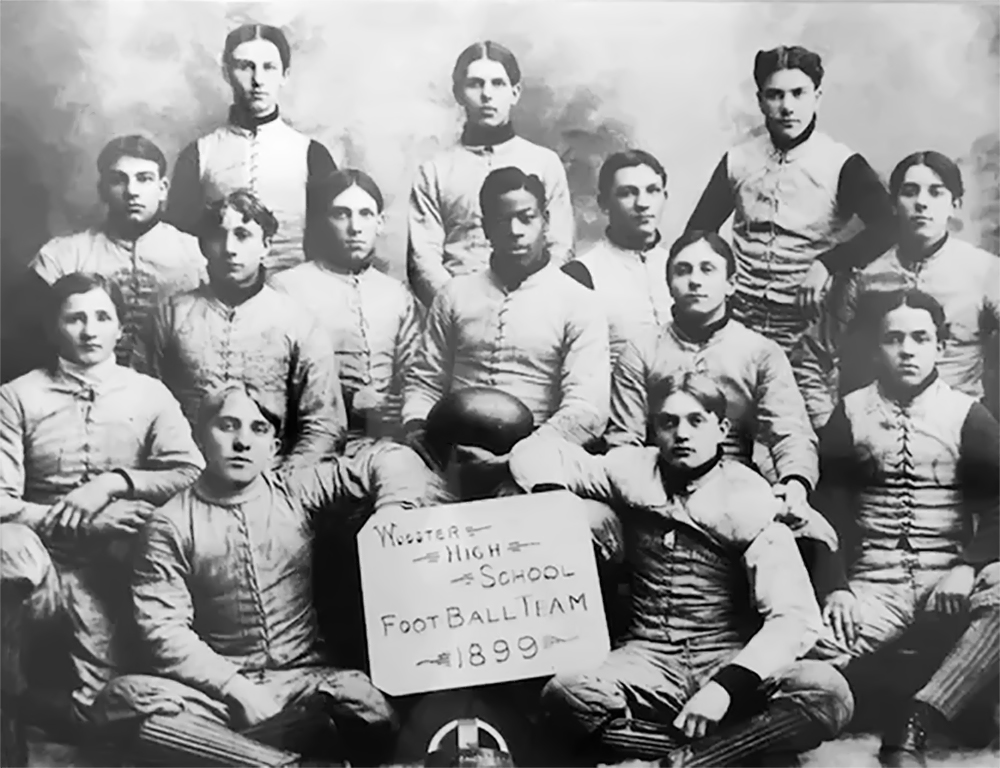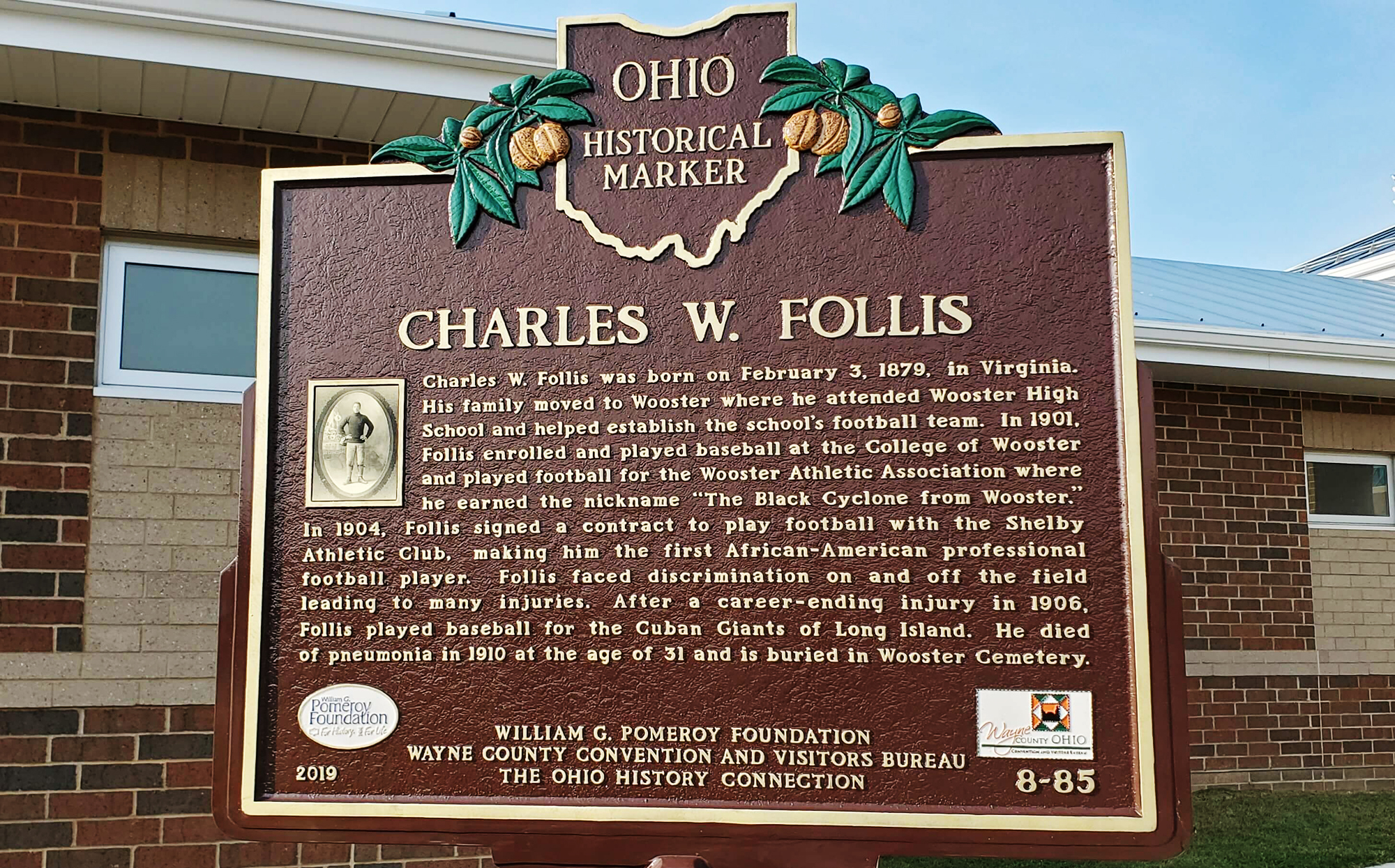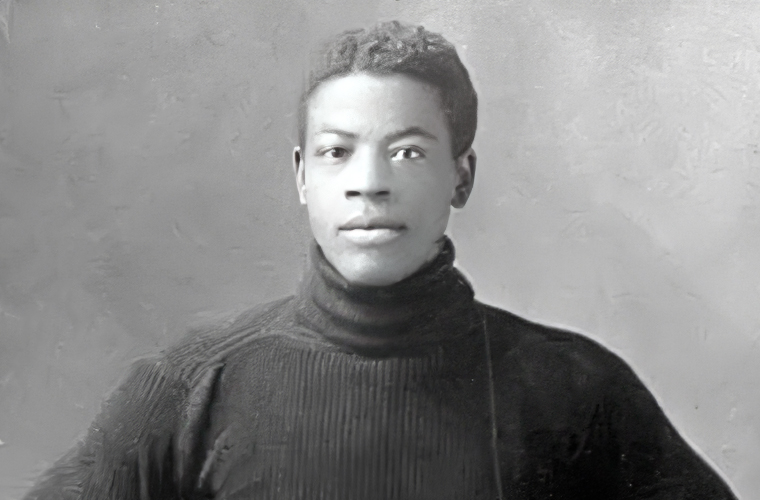Charles W. Follis, also known as “The Black Cyclone“, was the first Black professional American football player. He played for the Shelby Blues of the “Ohio League” from 1902 to 1906, and he was also the first Black catcher to move from college baseball into the Negro leagues.
Charles W. Follis was born on February 3, 1879, in Cloverdale, Virginia, to James Henry and Catherine Matilda Anderson Follis. His parents were former slaves who married in Virginia in 1873. Charles was probably the third born of seven children. His father was a farm laborer who moved the family to Wooster, Ohio, in 1885, seeking better opportunities and education for his children.
Charles attended Wooster High School, where he excelled in academics and athletics. He co-founded the school’s football team in 1899 and was named captain of the undefeated squad. He also played baseball and ran track for the school. He graduated in 1901 with honors and enrolled in the College of Wooster, where he continued to play football and baseball.

In 1901, Charles joined the Wooster Athletic Association, an amateur football team that competed against other local clubs. He earned the nickname “The Black Cyclone” for his speed, strength, and agility on the field. He caught the attention of Frank C. Schiffer, the manager of the Shelby Blues, a professional football team that was part of the Ohio League, a precursor to the National Football League (NFL). Schiffer offered Charles a contract to play for Shelby in 1902, making him the first Black man to receive payment for playing football on an integrated team.
Charles accepted the offer and moved to Shelby, where he worked at a local hardware store while playing football. He became a star halfback for the Blues, leading them to several victories and championships. He was respected by his teammates and opponents alike, despite facing racism and violence from some fans and players. He endured physical attacks, verbal abuse, and threats on and off the field, but he never backed down or retaliated. He played with dignity, courage, and professionalism.
In 1904, Charles signed a formal contract with Shelby, making him officially the first Black professional American football player. He helped the Blues achieve an 8-1-1 record that year, losing only to the Massillon Tigers, who were the Ohio League champions. In 1906, Charles suffered a career-ending injury while playing against the Franklin Athletic Club of Cleveland on Thanksgiving Day. He retired from football at the age of 27.
Charles was also a talented baseball player who played catcher for both Wooster High School and College. He was one of the first Black catchers to move from college baseball into the Negro leagues, which were professional baseball leagues for African Americans who were excluded from Major League Baseball (MLB). He played for several teams, including the Cuban Giants, the Philadelphia Giants, and the Akron Giants. He was known for his powerful arm, his defensive skills, and his leadership on the field.

After retiring from sports, Charles moved to Cleveland, where he worked as a waiter at a hotel. He also became involved in civic and social activities, such as joining a fraternal organization called the Improved Benevolent Protective Order of Elks of the World (IBPOEW), which was founded by African Americans in 1898. He married Minnie Estelle Jackson in 1909.
Unfortunately, Charles’ life was cut short by tuberculosis, a deadly disease that affected many people at that time. He died on April 5, 1910, at the age of 31. He was buried in Wooster Cemetery.
Charles W. Follis left behind a legacy of greatness that transcends sports and race. He was a pioneer who broke barriers and opened doors for other Black athletes who followed in his footsteps. He was a role model who inspired generations of people with his courage, perseverance, and excellence. He was a legend who made history and changed the game forever.
Today, Charles W. Follis is honored and remembered in various ways:
- Charles Follis Foundation was founded in Columbus, Ohio in 2021 by his descendants to preserve and share his legacy and to support organizations that promote education, music, and sports.
- The FOLLIS: Greatness Transcends book is a nonfiction novel that tells his story based on true facts, family experiences, and events from slavery to glory in a generation.
- The Charles Follis Memorial Park is a public park in Wooster, Ohio that features a statue of him and a plaque that commemorates his achievements.
- The Charles Follis Award is an annual award given by the Wooster Rotary Club to a high school senior who demonstrates outstanding athletic and academic performance.
- The Charles Follis Highway is a section of U.S. Route 30 in Ohio that is named after him.
- Charles Follis Day is a day of celebration and recognition that is held every year on February 3, his birthday, in Wooster, Ohio, and Shelby, Ohio.
Charles W. Follis was the first Black professional American football player, but he was much more than that. He was a hero, a trailblazer, and a cyclone who left an indelible mark on the world.

